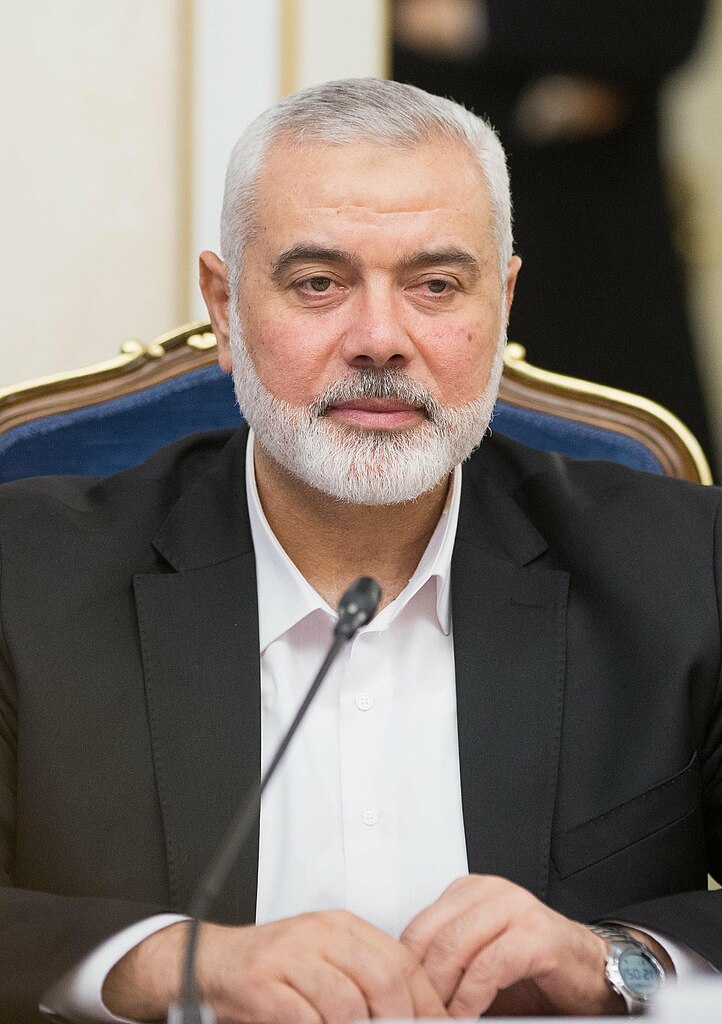
Ismail Haniyeh, head of Hama’s political bureau, at a meeting in Moscow (2020).
“The Hamas movement is part of the Palestinian national fabric.”
China has embarked on a policy characterized by diplomatic engagement with all regional parties alongside rhetorical alignment with the pro-Palestinian views that are dominant in the Muslim world and “Global South.”[i] In mid-March, a Chinese delegation met in Doha with the Qatar-based head of Hamas’s political bureau, Ismail Haniyeh. It was the first publicly acknowledged meeting between Chinese and Hamas officials since 7 October.[ii] The first accompanying excerpt from the Palestinian news agency Safa, reported noteworthy statements by China’s ambassador in Qatar describing Chinese interest in preserving ties with Hamas and describing the group as “part of the Palestinian national fabric.” The meeting should not be considered an expression of Chinese support for Hamas at the expense of other parties, given that it came at the end of a trip that also included visits with officials from Egypt, Israel, the Palestinian Authority, and Qatar.[iii] Instead, the meeting is noteworthy in that it confirms that China is less wary of Islamic activism than in recent years. As noted in the second excerpted article, from Qatar’s Al-Jazeera, China views Hamas and other mobilized Sunni groups with suspicion due to concerns over Uyghur Muslim activism in its western Xinjiang province. Uyghur-related concerns have previously put Beijing at odds with Sunni groups such as Hamas and their backers, including the Qatari government.[iv] More recently, though, these disagreements have subsided amidst a broader regional détente. This trend has not been affected by events since 7 October.This approach may lead to a greater Chinese alignment with Qatar, which has positioned itself as the most effective intermediary between interested governments and mobilized Sunni groups such as Hamas and the Taliban. China’s multi-partner approach to the Middle East is similar to Qatar’s, and one may expect these governments to fully put aside past disagreements regarding Muslim activism as they seek to position themselves as key brokers in a new regional order.
OE Insight Summary:
Diplomats from CHN held their first officially reported meeting with Hamas in QAT, indicating that China seeks good relations with all parties in the Middle East and has softened its distrust of mobilized Sunni Muslim groups such as Hamas.
Sources:
السفير الصيني: حماس جزء من النسيج الفلسطيني ونحرص على العلاقة معها
“Chinese Ambassador: Hamas is part of the Palestinian fabric and we are keen on our relationship with it,” Safa (Palestinian Press Agency), 17 March 2024. https://safa.ps/post/367879/%D8%A7%D9%84%D8%B3%D9%81%D9%8A%D8%B1-%D8%A7%D9%84%D8%B5%D9%8A%D9%86%D9%8A-%D8%AD%D9%85%D8%A7%D8%B3-%D8%AC%D8%B2%D8%A1-%D9%85%D9%86-%D8%A7%D9%84%D9%86%D8%B3%D9%8A%D8%AC-%D8%A7%D9%84%D9%81%D9%84%D8%B3%D8%B7%D9%8A%D9%86%D9%8A-%D9%88%D9%86%D8%AD%D8%B1%D8%B5-%D8%B9%D9%84%D9%89-%D8%A7%D9%84%D8%B9%D9%84%D8%A7%D9%82%D8%A9-%D9%85%D8%B9%D9%87%D8%A7
The Chinese Ambassador to the State of Qatar, Cao Xiaolin, stated on Sunday that the Hamas movement is part of the Palestinian national fabric and that China is keen on having relations with the group.
الصين تعترف بـ”حماس” بقليل من الخجل!
“China recognizes “Hamas” with little shame!” al-Jazeera Mubashir (Qatari news agency),24 March 2024. https://www.aljazeeramubasher.net/opinions/2024/3/24/%D8%A7%D9%84%D8%B5%D9%8A%D9%86-%D8%AA%D8%B9%D8%AA%D8%B1%D9%81-%D8%A8%D9%80%D8%AD%D9%85%D8%A7%D8%B3-%D8%A8%D9%82%D9%84%D9%8A%D9%84-%D9%85%D9%86-%D8%A7%D9%84%D8%AE%D8%AC%D9%84
The meeting did not appear in international newspapers, and some news sites covered it hastily, quoting an official statement issued by “Hamas.” We did not find an echo of it in the Chinese media, except for one sentence, which was reported by the “Xinhua” agency and the websites of the Chinese embassy in Egypt and Qatar…
Beijing includes “Hamas” on the list of extremist Islamic groups, like the ones it is pursuing in northwest China on charges of “terrorism” and inciting Muslim Uyghurs, Kazaks, and Uzbeks to secede. It does not classify Hamas as a terrorist group, as the United States and its allies do, to avoid being drawn in by the West into problems that it does not need, in a region that is witnessing constant political and security fluctuations, which it will not be able to resolve….
China’s fears of “Hamas” come against the backdrop of strong ideological hostility from the ruling Communist Party, which rejects citizens’ adoption of any religious or political belief other than what the party adopts, under the pretext of protecting the nation-state…
[Chinese diplomat] Wang Kejian lived through the Arab Spring revolutions and knows a lot about the Islamic and tribal movements in the region. He exchanged books with us and talked a lot about them. He has a good understanding of “Hamas” as a national liberation movement…
Notes:
[i] See: “China’s Game in Gaza,” Foreign Affairs,8 January 2024. https://www.foreignaffairs.com/china/chinas-game-gaza
[ii] China’s ambassador to Qatar met with Haniyeh in late February 2024, in a meeting reported by Hamas but never officially confirmed by the Chinese government. See: “Hamas Leader Ismail Haniyeh Meets With Chinese Ambassador To Qatar,” MEMRI (The Middle East Media Research Institute),29 February 2024. https://www.memri.org/reports/hamas-leader-ismail-haniyeh-meets-chinese-ambassador-qatar
[iii] For more details see: “Chinese envoy meets Hamas chief Haniyeh after first visit to Israel since Gaza war began,” CNN, 19 March 2024. https://www.cnn.com/2024/03/19/china/chinese-envoy-hamas-meeting-israel-intl-hnk/index.html “China’s Middle East diplomat meets Hamas’ Haniyeh in Qatar,” al-Monitor,19 March 2024. https://www.al-monitor.com/originals/2024/03/chinas-middle-east-diplomat-meets-hamas-haniyeh-qatar “Three reasons behind rare China-Hamas meeting in Qatar,” al-Monitor, 22 March 2024. https://www.al-monitor.com/originals/2024/03/three-reasons-behind-rare-china-hamas-meeting-qatar
[iv] Alongside Hamas, the Qatari government was among the few Arab critics of China’s Xinjiang policies. Beginning in 2022, however, Qatar ceased to publicly oppose these policies. See: “Activists hail Qatar withdrawal from pro-China text over Uighurs,” al-Jazeera,21 August 2019. https://www.aljazeera.com/news/2019/8/21/activists-hail-qatar-withdrawal-from-pro-china-text-over-uighurs “U.N. body rejects debate on China’s treatment of Uyghur Muslims in blow to West,” Reuters,6 October 2022. https://www.reuters.com/world/china/un-body-rejects-historic-debate-chinas-human-rights-record-2022-10-06/ “U.N. body rejects debate on China’s treatment of Uyghur Muslims in blow to West,” Chinese Embassy in Qatar,25 December 2022. http://qa.china-embassy.gov.cn/eng/zkgx/202212/t20221225_10994873.htm
